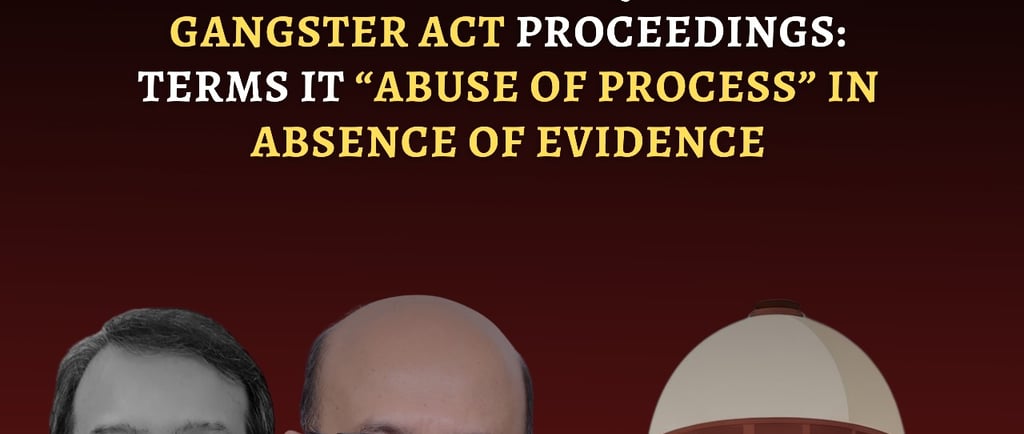Supreme Court Quashes Gangster Act Proceedings: Terms It “Abuse of Process” in Absence of Evidence
SC finds serious procedural lapses, lack of material evidence, and violation of Uttar Pradesh Gangsters Rules; calls for strict adherence to 2024 Guidelines
6/21/20253 min read


In a significant judgment, the Supreme Court of India quashed criminal proceedings initiated under the Uttar Pradesh Gangsters and Anti-Social Activities (Prevention) Act, 1986, citing lack of evidence, procedural irregularities, and misuse of legal provisions. The case arose from two criminal appeals challenging an Allahabad High Court order that refused to quash the proceedings despite the apparent absence of prima facie evidence.
A Division Bench comprising Justices J.B. Pardiwala and Manoj Misra held that continuing the prosecution would amount to undue harassment and a clear abuse of process of law, thereby setting aside the impugned orders, including non-bailable warrants issued against the accused.
Case Background: FIR under Gangsters Act Without Valid Basis
The matter stemmed from an FIR lodged in 2018, accusing the appellant and another individual of forming an organized gang under Section 2(b) of the Act. The FIR alleged that the accused were involved in economic crimes such as forgery and fraud, falling under various Chapters of the Indian Penal Code (IPC).
Subsequently, the Special Judge (Gangsters Act) issued non-bailable warrants, and later rejected the accused’s plea to recall the same. The accused approached the High Court under Section 482 of the CrPC, seeking quashing of the proceedings. After the High Court dismissed the application, the appellant moved the Supreme Court.
Supreme Court’s Legal Analysis: Lack of Substantive Evidence
Delving into the legal framework under the Gangsters Act, the Supreme Court highlighted that mere association with alleged criminals is not sufficient to label someone a gangster. It must be shown that the group was engaged in activities mentioned under clauses (i) to (xxv) of Section 2(b) with the objective of disrupting public order or securing unlawful advantage.
The Court noted that the chargesheet filed by the investigation team was devoid of credible annexures or substantive documents. Instead, it was found to be a verbatim copy of the FIR and base cases, lacking independent evidentiary value. This approach, the Court warned, displayed a casual and non-serious attitude of the investigating authority.
Crucially, the Supreme Court remarked that the investigating agency had no authority to declare an offence as “proved”—that function lies exclusively with the trial court.
FIR Without Valid Base Cases is Unsustainable
Highlighting a critical flaw, the Court observed that the subject FIR under the Gangsters Act was filed nearly a year after the base FIRs. In those base FIRs, the co-accused was not named, which weakened the foundation for describing the duo as a gang. Moreover, there was no evidence of threat, violence, or intimidation—essential elements under the Act.
Additionally, the Court found it questionable that other accused named in the base FIRs were not investigated, raising doubts about the bona fides of the entire investigation.
Gang Chart Process Violated 2021 Rules
The Court found that the authorities failed to follow due process under the Uttar Pradesh Gangsters and Anti-Social Activities (Prevention) Rules, 2021. There was no evidence of a joint meeting before approving the gang-chart, nor any record of the minutes maintained by the District Magistrate as required under Rule 5(3)(a).
Shockingly, the approving authority had merely signed a pre-printed form—a move the Court slammed as a mechanical act and total non-application of mind. The Court emphasized that the satisfaction of the approving authority must be independent and based on material facts, not a cyclostyled reproduction of the recommending officer’s notes.
Failure to Record Satisfaction Is Fatal to Prosecution
According to the Court, initiating proceedings under the Act without properly recorded satisfaction of all relevant authorities—Additional SP, SSP, and DM—was impermissible and unconstitutional. The Court stated that this satisfaction should reflect reasoned application of mind, ensuring that such severe preventive laws are not used arbitrarily.
The authorities involved had reduced their constitutional responsibilities to mere formalities, thus undermining both Rule of Law and individual liberty, the Court added.
No Prima Facie Case Made Out
Upon evaluating the case facts, the Court ruled that the materials collected were speculative at best and failed to establish a prima facie case under Sections 2 and 3 of the Act. The vague references to forged signatures lacked sufficient clarity or legal weight to initiate prosecution under such stringent provisions.
Misuse of Criminal Process and Section 482 CrPC
The Supreme Court reminded lower courts of the core principle underlying Section 482 CrPC—to prevent misuse of the judicial process. Courts must intervene when legal machinery is misused to oppress or harass individuals without genuine evidence.
In this instance, the High Court was found to have grossly erred in refusing to quash the FIR, despite overwhelming indicators that the case was maliciously prosecuted.
Importance of Guidelines Dated 02-12-2024
Referencing its earlier ruling in Gorakh Nath Mishra v. State of U.P., 2024 SCC OnLine SC 4509, the Supreme Court reaffirmed the necessity of adhering to the State-issued Guidelines for invoking the Gangsters Act. It ordered strict compliance with the Checklist issued therein to ensure procedural safeguards are not bypassed.
Conclusion: Judicial Call for Procedural Integrity
In conclusion, the Supreme Court quashed the impugned proceedings and non-bailable warrants, reiterating that criminal law must not be used as a tool for harassment. The ruling strongly reasserts the judiciary’s role in upholding liberty, preventing procedural abuse, and ensuring that special criminal laws are not invoked without strict compliance with legal safeguards.
